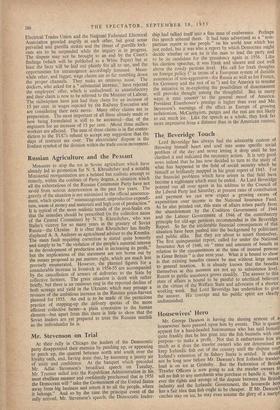Mr. Stevenson on Trial
At their rally in Chicago the leaders of the Democratic party disappointed their enemies by patching up, or appearing to patch up, the quarrel between north and south over the loyalty oath, and, having done that, by assuming a jaunty air of unity and confidence. At the banquet which preceded Mr. Adlai Stevenson's broadcast speech on Tuesday, Mr. Truman sailed into the Republican Administration in his most ebullient manner and confidently proclaimed that in 1956 the Democrats will " take the Government of the United States away from big business and return it to all the people, where it belongs." And so by the time the principal event of the rally arrived, Mr. Stevenson's speech, the Democratic leader- ship had talked itself into a fine state of exuberance. Perhaps this speech sobered them. It had been advertised as a " non- partisan report to the people " on his world tour which has just ended, but it was also a report by which Democrats might decide whether or not he is the man to lead the party and to be its candidate for the presidency again in 1956. Like his election speeches, it was frank and sincere and cast well above the rowdy partisan level. His call for fresh thoughts on foreign Tolley (" in terms of a European system of durable assurances of non-aggression—for Russia as well as for France, for Germany and the rest of us ") and for America to resume the initiative in re-exploring the possibilities of disarmament will provoke thought among the thoughtful. But in many ways it runs counter to the general mood of America. President Eisenhower's prestige is higher than ever and Mr. Stevenson's warnings of the effect in Europe of growing isolationism, McCarthyism, purges and the rest are not likely to cut much ice. Like the speech as a whole, they look far more impressive from a distance than in the American context.


































 Previous page
Previous page